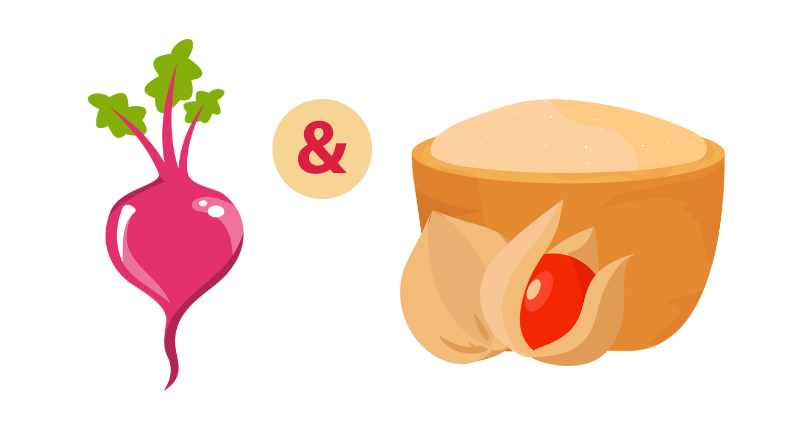Ashwagandha and beetroot are two of the best gifts from nature. Each one has a wealth of individual advantages, and when used together they have an extraordinary synergy that can improve health and well-being greatly. Do you want to know more about this pair?
In this complete guide, we’ll go into detail about the world of these two powerhouses – their individual benefits, combined results and why they might be just what you need for your health routine.
A CLOSER LOOK AT ASHWAGANDHA
Ashwagandha, also known scientifically as Withania somnifera is an Indian plant that grows in parts of Africa. Also known as the “king of Ayurvedic herbs,” it has been utilized for thousands of years to cure a wide variety of illnesses.
THE HISTORY OF ASHWAGANDHA USE ACROSS THE GLOBE
Ashwagandha roots deep in the cultures of traditional people across the world. Though its initial purpose can be traced to the Ayurvedic practices in India [^1^], where it revived body and developed immune system, its fame spread. In Africa, it was held in high regard for its adaptogenic properties and the Middle East where ginseng became an important aspect of traditional medicine valued for its ability to increase energy levels.
RESEARCH FINDINGS: THE DEEP BENEFITS
Modern science only confirms what traditional cultures have been convinced of for centuries. Among the most striking benefits found in scientific research are: The fact that the state is not allowed to participate in this sphere of activity, and even more so – pay for it with public funds, indicates how much different people are from each other.
Stress Reduction
Being an adaptogen, Ashwagandha helps to manage and reduce stress[^2^].
Enhanced Cognitive Function
Research has shown that Ashwagandha may improve memory and other cognitive functions[^2^].
Improved Sleep
It helps in improving the quality of sleep and hence those suffering from insomnia are benefited[^3^].
BEETROOT FOR HEALTH: MORE THAN A VEGETABLE
Beetroot is a unique root vegetable that has an arresting crimson colour and contains vitamins, minerals as well as beneficial compounds.
Rich in Nitrates
These compounds that are naturally found in beetroot have proven to enhance blood flow and lower the level of pressure[^4^].
Boosts Stamina
The nitrates in beetroot improve athletic performance by improving the efficiency of oxygen utilization[^5^].
Packed with Antioxidants
Betalains is present in beetroot, providing powerful antioxidant and anti-inflammatory properties[^6^].
ASHWAGANDHA & BEETROOT: A COMPLEMENTARY DUO
The usage of Ashwagandha and beetroot may seem unusual, but they can bring synergistic effects.
Enhanced Physical Performance
Although beetroot has a propelling effect on stamina, Ashwagandha plays an important role in muscle recovery and these two are the perfect combination for athletes and fitness enthusiasts.
Optimal Brain Function
The combination of adaptogenic property in ashwagandha with the nitrates present within beetroot can lead to enhanced cognition and stress management[^2,4].
Improved Cardiovascular Health
These herbal remedies promote cardiac health by improving blood circulation and lowering the pressure of blood.
WHO SHOULD CHOOSE TO SUPPLEMENT WITH ASHWAGANDHA?
Ashwagandha is a highly adaptable herb, appropriate for both young and old. Those who may particularly benefit include: However, if this is the case then one should not be surprised that the money was stolen by someone who uses a different name.
Stressed Individuals
In light of its adaptogenic nature, it can prove to be a stimulant for those who are experiencing major stress either professionally or personally.
Fitness Enthusiasts
It helps in muscle recovery and increases energy levels, perfect for people who are constantly involved in physical activity.
People with Sleep Disturbances
Ashwagandha has sleep-promoting properties, which can improve the quality of sleep and provide comfort to people with sleeping disorders.
HOW TO INCLUDE BOTH FOODS IN YOUR DAILY LIFE
Combining Ashwagandha and beetroot into one’s daily routine is not as difficult as it may seem.
Opt for Tinctures
Tinctures, especially those from reliable sources such as drashwame.com have a fast absorption into the bloodstream making them act quickly and cause immediate effects. In addition, they have a longer life compared to powders or capsules and enable accurate dosage based on personal requirements.
Incorporate into Meals
Beetroot can be used in juice, roasted or even added to salads. In the case of Ashwagandha, although its tincture form is highly recommended, one can also take advantage of its powdered form and sprinkle it over meals or blend it into a smoothie.
Consistency is Key
As with all natural treatments, the benefits of Ashwagandha and beetroot become apparent through regular consumption. Make them part of your daily routine for the best results.
CONCLUSION
The unequalled force of nature is usually fascinating. Ashwagandha and beetroot, have proven their worth as established elements of the traditional worldview and in modern science-related records. The blend of such powerful herbal treatments leads to the road towards integrated well-being.
First, make sure that you always source the best products and consult a professional before starting any supplementation.
REFERENCES
- Ashwagandha – The University of Michigan Health
- Chandrasekhar, K., et al. (2012). “A prospective, randomized double-blind, placebo-controlled study of safety and efficacy…
- Kaushik, M.K., et al. (2017). “Triethylene glycol, an active component of Ashwagandha…
- Coles, L.T., & Clifton, P.M. (2012). “Effect of beetroot juice on lowering blood pressure…
- Domínguez, R., et al. (2017). “Effects of Beetroot Juice Supplementation on Cardiorespiratory Endurance…
- Krajka-Kuźniak, V., et al. (2017). “The effect of betalains on NF-κB pathway…
- Singh, N., Bhalla, M., de Jager, P., & Gilca, M. (2011). An overview on Ashwagandha: A Rasayana (Rejuvenator) of Ayurveda.


